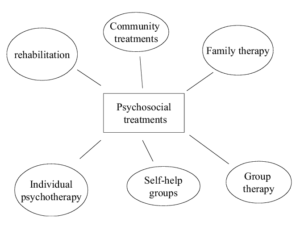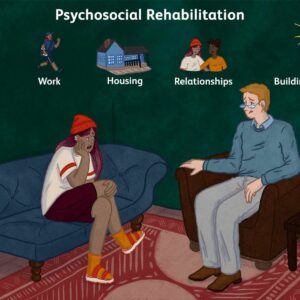Contents

Psychosocial treatments are psychological interventions that aim to treat mental health disorders. They include a variety of techniques, such as cognitive-behavioral therapy, that are very helpful for people managing their thoughts and emotions. Psychosocial Treatments are a form of therapy that deals with mental health in the social context. It is based on the idea that people’s thoughts, feelings, and behaviors are influenced by their interactions with others. If you’ve ever had to deal with bullying or trauma at school, then this type of psychotherapy might be for you.
Psychosocial treatments help treat a variety of mental illnesses, including the following:
- Depression
- Anxiety disorders
- Eating disorders
- Schizophrenia
- Bipolar disorder
- Post-traumatic stress disorder (PTSD)
- Substance abuse disorders
- Autism spectrum disorders
- Social anxiety disorder
- Personality disorders
There are a variety of different types of psychosocial treatments, including the following:
Cognitive-behavioral therapy (CBT)
 CBT is a type of psychotherapy that is based on the cognitive model. It is commonly in use to treat depression, anxiety disorders, and other types of mental illness. One type of psychosocial treatment that is quite effective in reducing the effects of bullying is cognitive-behavioral therapy (CBT). It is helpful in treating depression and anxiety. As well as the symptoms that stem from these conditions such as feeling isolated and not wanting to go to school. CBT can be run in a group format which allows for children who have similar problems to work together and support one another’s growth.
CBT is a type of psychotherapy that is based on the cognitive model. It is commonly in use to treat depression, anxiety disorders, and other types of mental illness. One type of psychosocial treatment that is quite effective in reducing the effects of bullying is cognitive-behavioral therapy (CBT). It is helpful in treating depression and anxiety. As well as the symptoms that stem from these conditions such as feeling isolated and not wanting to go to school. CBT can be run in a group format which allows for children who have similar problems to work together and support one another’s growth.
Group CBT is very effective because it builds social support and allows children to learn from one another.
Dialectical behavioral therapy (DBT)
DBT is a type of psychotherapy that specifically treats borderline personality disorder. But it can also be used to treat other mental illnesses.
Interpersonal psychotherapy (IPT)
IP is a type of psychotherapy that was originally designed to treat depression, but it can also be used to treat certain anxiety disorders and eating disorders.
Reality therapy
Reality therapy is a type of brief, problem-solving therapy that was originally developed to treat addiction. However, it is also beneficial in treating other mental illnesses.
Social skills training

Social skills training is a type of psychotherapy that involves learning and practicing specific social skills in order to improve a person’s ability to interact with others. It is most commonly used to treat autism spectrum disorders and social anxiety disorder. Other options for psychosocial treatments for include social skills training where people learn appropriate behaviors in different social situations and how to control their impulses appropriately. This type of training can help those who have been bullied to learn how to make friends and feel more comfortable in social settings.
Supportive psychotherapy
Supportive psychotherapy is a type of therapy that provides emotional support and guidance to people who are struggling with a mental illness.
Psychodynamic psychotherapy
Psychodynamic psychotherapy is a type of long-term, psychoanalytic therapy that is used to treat a variety of mental illnesses. It is based on the theory that unresolved childhood conflicts can cause mental illness as an adult, and it involves exploring those emotional issues during therapy.
Psychoeducation
In addition to the different types of psychosocial treatments, there is also a type of treatment called psychoeducation. Psychoeducation is a type of educational intervention that is used to teach people about mental health disorders. It includes information about the signs and symptoms of mental illness, the different treatment options available, and how to manage the disorder.
Support groups
Yet another type of psychosocial treatment for mental illness is support groups. Support groups are a type of mutual help group that brings together people who have the same illness so that they can share advice and emotional support with one another.
Self-help groups
Another type of group treatment for mental illness is self-help groups. Self-help groups are groups of people who meet together to provide support and assistance to one another in their own recovery from mental illness.
In addition, relaxation techniques such as yoga and meditation can be helpful in reducing stress and improving mood. These techniques can be done at home on one’s own or in a group setting with others who are also struggling with stress management.

There are many benefits to using psychosocial treatments, including the following:
Inexpensive
They’re generally less expensive than other types of treatment. Some of the therapies, like CBT, can even be done on your own with a book or a course.
Safe
Psychosocial treatments are generally very safe. Especially if you compare it to medications, these type of treatments has no side effects.
Effective
They are often very effective in treating mental health disorders. Studies have shown that psychosocial treatments are often just as effective as medication in treating mental health disorders. Psychosocial treatments can be very effective in treating mental illnesses and improving a person’s quality of life. Patients can also take the medication in order to get the best possible care.
Short-term
Most psychosocial treatments are short-term, which means that people can usually see results relatively quickly.
Convenient
Many psychosocial treatments are possible in a therapist’s office, which makes them convenient for people who live or work near one. They’re widely available.
They allow people to get better on their own. Most of them are effective treatments for specific mental illnesses. These benefits make psychosocial treatments a more popular choice than some other types of treatment.

Despite the many benefits, there are also some drawbacks to using psychosocial treatments:
Don’t Work For Everyone
Some people may not respond well to certain therapy techniques. For example, supportive therapy and reality therapy are generally less effective than other types of psychosocial treatment.
Requires A Strong Commitment
People need to be willing and able to participate in therapy sessions on a regular basis. They also need the motivation to actively work on changing their thoughts, feelings, and behaviors. This can be challenging for people who are dealing with mental illness because it often involves changing behaviors that may have been coping mechanisms for a long time.
Not Always Covered By Insurance
Unfortunately, many health insurance plans don’t cover psychosocial treatments, which can make them very expensive for people who need to see a therapist regularly. This is especially true of therapy sessions that involve more than one person, such as family therapy.
Less Effective Than Other Types Of Treatment
If you have the option to choose between psychosocial treatments and medication, for example, some people may find that it’s easier to take a pill every day instead of having to go to therapy sessions on a regular basis.
May Be Uncomfortable
Some people find certain psychosocial treatments to be uncomfortable or challenging. This is particularly true of therapies that involve discussing personal issues or feelings.
Side Effects
Some psychosocial treatments, such as medication and electroconvulsive therapy, can have side effects.
Overall, the benefits of psychosocial treatments tend to outweigh the drawbacks, making them a popular choice for people who are struggling with mental health disorders. They are a safe, effective, and affordable way to treat many mental health disorders.
If you are struggling with a mental illness, it is important to seek out help from a therapist. There are many different types of psychosocial treatments available. So you can find one that is right for you. Talk to your doctor or therapist about your options and don’t hesitate to ask for help. You deserve to get better and feel happy and healthy again.
Psychosocial treatments can be provided by a variety of different professionals, including the following:

- Psychologists
- Clinical social workers
- Psychiatrists
- Counselors or therapists
- Social workers
- Nurses
- Occupational therapists
- Physician assistants
- Family members or friends
- Self-help groups
Conclusion
Psychosocial treatments are a relatively new approach to treating mental health conditions. They help people with disorders like depression, anxiety, bipolar disorder, and schizophrenia by addressing the social factors that contribute to these illnesses. Psychotherapy is one form of psychosocial treatment in which patients work towards understanding their condition and coping mechanisms for stressors in order to reduce symptoms such as anger or sadness. Cognitive-behavioral therapy (CBT) may also be an option when someone needs to support developing skills for regulating emotions. If you are looking for Psychosocial Treatments, do consult our team and healthcare experts.
If you are looking for affordable Online Counseling MantraCare can help: Book a trial therapy session


